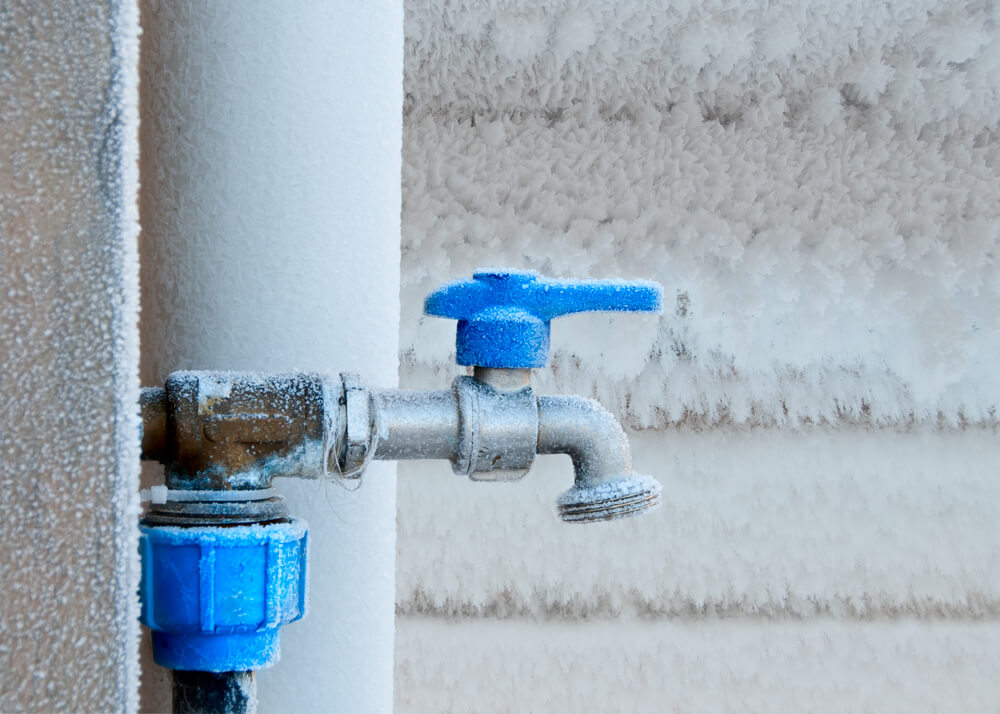When the temperatures drop and the days become shorter, it’s only natural for people to retreat to their homes for warmth and comfort. However, winter weather doesn’t just have the potential to chill you while you’re outdoors; it can also do some significant damage to your home if you’re not careful.
For instance, during the cold winter months, there’s a greater chance that your basement and crawlspace pipes freeze, regardless of where you live. If a pipe freezes in your home and you don’t act fast to thaw it, the water will expand and may cause the pipe to burst altogether. This can flood parts of your home and lead to costly water damage restoration.
The good news is that it’s fairly easy to thaw a frozen pipe, and there are many things you can do to prevent it from freezing altogether. Take a look at some advice on what to do if your pipes freeze and how you can prevent these issues from happening in the future.

What Causes Frozen Pipes?
A frozen pipe can be attributed to many different causes. Whether the temperatures drop below freezing or your home has inadequate heating, it’s important to understand how these occurrences happen so you can properly mend the issues and nip further problems in the bud.
- Temperatures Drop Well Below Freezing: While the freezing temperature for water is 32 degrees, the water inside your pipes needs to be significantly colder in order to harden. If the outside temperature hits below 20 degrees, the water in your pipes can freeze up.
- Pipes Are in Unheated Areas: In many cases, attics, crawlspaces, and sometimes even basements do not maintain a consistent heat level during the winter. Pipes in these areas can be more vulnerable to freezing due to not receiving enough heat throughout the day.
- Pipes Are on the Outside of the Home: Pipes that are located on the outside of your home are more vulnerable to freezing up, especially if there is no insulation or cracks on some of those walls.
- Insufficient Insulation: Insulation is needed to protect not only your home and comfort from the frigid temperatures but also your pipes from freezing.
- Drafty Spots in the Home: If any areas in your home are draftier than other areas, pipes may freeze there more than in other places.
Why Are Frozen Pipes Bad?
Frozen pipes in the house are no better than when your car stalls in the morning or your AC freezes up. When the water in your pipes freezes, the water can expand and cause your pipes to burst. If this happens, your entire plumbing system will be affected, and you will be faced with expensive emergency plumbing repairs.
If enough pipes are damaged, you may need to repipe your entire system, which can take a considerable amount of time to complete. It’s better to do everything in your power to prevent frozen pipes so you can avoid the cost of repair services.
What to Do If Pipes Freeze
If your pipes freeze, you need to act quickly to protect your pipes from further damage. Follow these four steps so you can find the cause and prevent any other issues:
- Turn the Water Off: Find the shutoff valve and turn it clockwise to shut off the main water supply.
- Open Up The Faucets: Relieve pressure and facilitate water escape by opening all faucets connected to the frozen pipe once the main water supply is turned off.
- Look for Leaks: Thoroughly inspect the pipe and surrounding areas to identify any visible leaks. Early leak repair and detection is crucial for preventing water damage and ensuring timely repairs.
- Heat the Area Around the Pipe: Utilize a heating source, such as a hair dryer or heat lamp, to warm the area surrounding the frozen pipe. Gradual thawing can restore water flow without causing additional damage.
How to Keep Pipes From Freezing
Now that you know how to thaw your pipes if and when they freeze, you need to know how you can prevent them from ever freezing again. Here is some advice on how to ensure your pipes stay unfrozen during the winter season:
- Open cabinets to circulate air
- Keep faucets dripping to keep water moving
- Maintain a consistent indoor temperature throughout the day
- Insulate your pipes for additional warmth
If you run into any plumbing issues within your home during the winter, reach out to our experienced plumbers at Gilmore. Our team can help you with any problems your pipes are facing, especially frozen ones.
If you are dealing with frozen water pipes in the Sacramento Valley or Roseville, California, area, contact us to schedule an appointment with our team of experts. We’ll make sure you have a reliable plumbing system throughout the winter season.

